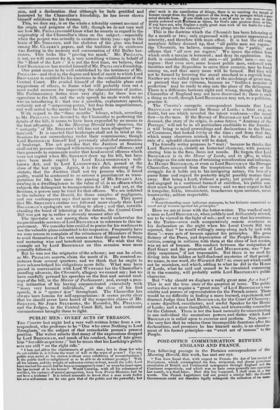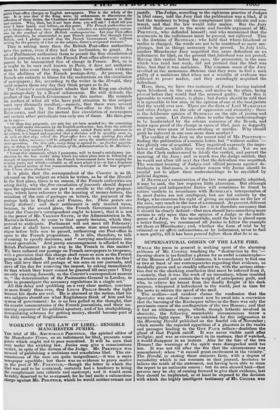POST-OFFICE COMMUNICATION BETWEEN ENGLAND AND FRANCE.
THE following passage in the Parisian correspondence of the Morning Herald, this week, has met our eye. "You have found that, with respect to France, the Act of last ses-ion of Parliament, which contemplated the free, reciprocal, and almost gratuitous circulation of British and Continental newspapers through England and the Continent respectively, and which was to have come generally into operation last month, is a dead letter. How this has happened, I shall state in a few words. The French Legislature had not passed a similar bill: the French Government could not therefore legally relinquish the collection of its nitre- pealed Post-office charges on English newspapers. This is the whole of the case. It is true that if the King were, by ordonnance, to discontinue the collection of those duties, the Chambers would sanction that measure in their next session. Why, then, has it not been done, you will ask ? I shall tell you what I have heard, and believe, on this point. The French authorities are sot to blame—they hare been indisposed to volunteer an anticipatory conces- sion by the conduct of their British contemporaries. Let your Post.office people, therefore, be commanded to pass French journals free through Great britain, and I pledge my self that the French Government will, without waiting for the passing of a law on the subject, direct a reciprocal measure." This is asking more than the British Post-office authorities have the power, even if they had the inclination, to grant. An act of Parliament authorizes them to permit the free circulation of French journals, as soon as the French Post.office allows our news- papers to be transmitted free of charge in France. But, as is or ought to be very well known in Paris, it does not authorize them to take even that step, until they have sufficient evidence of the abolition of the French postage-duty. At present, the French are entirely to blame for the restrictions on the circulation of newspapers ; for, according to the writer in the Herald, they :Quid remove them any day they think proper so to do. The Courier's correspondent admits that the King can abolish the postage-duty by a Royal ordonnance. He still defends the conduct of the French Government in this matter. He reminds his readers of what all who have paid attention to this subject mist very distinctly recollect,—namely, that there were several proposals made by the French Post-office to the Duke of RiensioNn, and that the mutual free circulation of newspapers and certain other periodicals was only one of these. He then goes on to say— "Of these four proposals, one only has yet been acceded to ; the remaining three are still under discussion by the English authorities : but, from the activity of Mr. Villcrs (Vernon) Smith, who recently visited Paris with reference to the subject, it is hoped and expected that a decision will be speedily come to. As soon as that step, which Me Post-office here is only waiting for, shall hare been taken, measures will be adopted to carry the ameliorations into in- stant operation. On this side, erery thing is agreed to ; no further negotia- tion, no delay, is sought. The decision of the.Administration in St. Martin's. le-Grand is only waited for. "I trust this statement, which I guarantee, will be found a satisfactory jus- tification for the four weeks' delay which has taken place here in following an example of improvement which the French Government have been urging for as many years, and which—valuable as all must admit it is—is but a fragment in the general system of free communication, developed in the four proposi- tions I have above alluded to."
It is plain that the correspondent of the Courier is as ill- informed on the subject on which he writes, as he of the Herald. In the first place, there is no reason, if the French authorities are acting fairly, why the free circulation of journals should depend upon the agreement on our part to accede to the other proposi- tions, which have reference to the insuring of money-letters, the reduction of the rate of postages on letters, the payment of the postage both in England and France, &c. These points are totally distinct; and their settlement is only insisted upon, because, in the second place, the French Government knows (what the Courier's correspondent ought to know), that it is not in the pbwer of Mr. VERNON SMITH, or the Administration in St. Martin's-le-Grand, to come to that speedy decision, which they pretend to anticipate. Parliament will not meet till February; and after it shall have assembled, some time must necessarily elapse before bills can be passed, authorizing our Post-office to agree to the French propositions. It is idle, therefore, to talk of coming to speedy decisions, and "carrying ameliorations into instant operation." And pretty encouragement is afforded to the British Parliament to give way to the French in this matter ! We have reduced our postage on French newspapers to twopence, with a provision that this charge shall cease as soon as the French postage is abolished. But what do the French in return for this ? They still levy their old postage of ten sous on our journals, and stave off the day for removing the impost, by asking immediately for that which they know cannot be granted till next year! They are only awaiting, forsooth, as the Courier's correspondent assures us, " the determination of the Postmaster-General in London, in order to promulgate the necessary regulations in a single act." All this delay and quibbling on a very clear matter, convince us more firmly than ever, that LOUIS PHILIP dreads the light
because his deeds are evil. He is alarmed at the notion, that his own subjects should see what Englishmen think of him and his system of government: he is no less galled at the thought, that the caustic commentaries of the French journalists, and their un- sparing exposure of his political apostacy, and of his stockjobbing, monopolizing schemes for getting money, should become part of the daily reading of Englishmen.



















 Previous page
Previous page